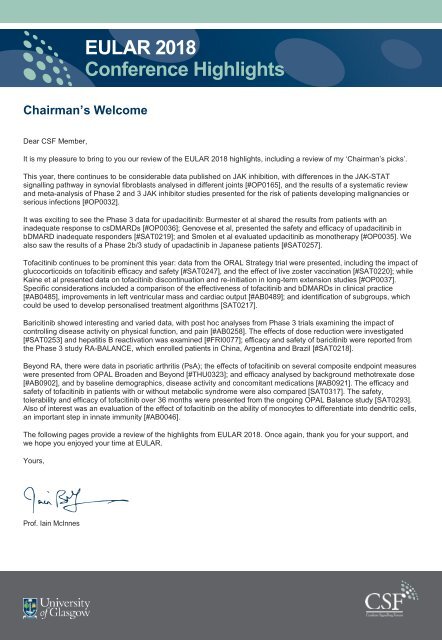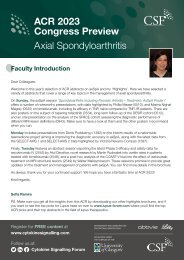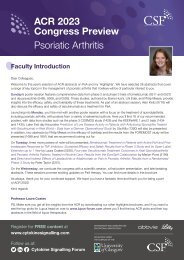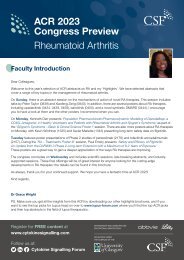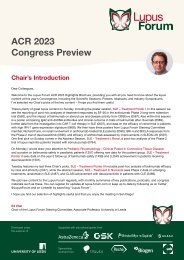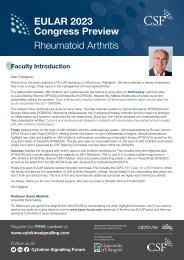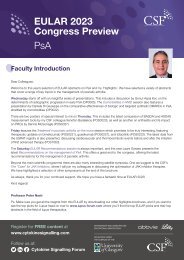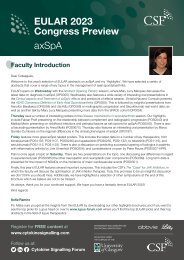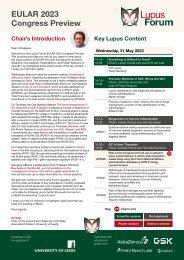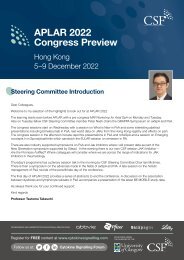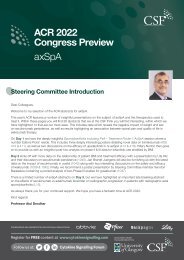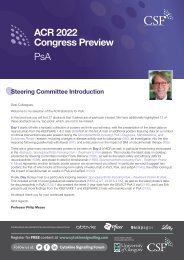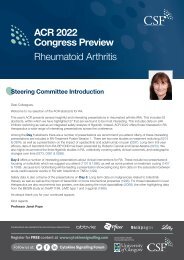EULAR 2018 Review
Create successful ePaper yourself
Turn your PDF publications into a flip-book with our unique Google optimized e-Paper software.
<strong>EULAR</strong> <strong>2018</strong><br />
Conference Highlights<br />
Chairman’s Welcome<br />
Dear CSF Member,<br />
It is my pleasure to bring to you our review of the <strong>EULAR</strong> <strong>2018</strong> highlights, including a review of my ‘Chairman’s picks’.<br />
This year, there continues to be considerable data published on JAK inhibition, with differences in the JAK-STAT<br />
signalling pathway in synovial fibroblasts analysed in different joints [#OP0165], and the results of a systematic review<br />
and meta-analysis of Phase 2 and 3 JAK inhibitor studies presented for the risk of patients developing malignancies or<br />
serious infections [#OP0032].<br />
It was exciting to see the Phase 3 data for upadacitinib: Burmester et al shared the results from patients with an<br />
inadequate response to csDMARDs [#OP0036]; Genovese et al, presented the safety and efficacy of upadacitinib in<br />
bDMARD inadequate responders [#SAT0219]; and Smolen et al evaluated updacitinib as monotherapy [#OP0035]. We<br />
also saw the results of a Phase 2b/3 study of upadactinib in Japanese patients [#SAT0257].<br />
Tofacitinib continues to be prominent this year: data from the ORAL Strategy trial were presented, including the impact of<br />
glucocorticoids on tofacitinib efficacy and safety [#SAT0247], and the effect of live zoster vaccination [#SAT0220]; while<br />
Kaine et al presented data on tofacitinib discontinuation and re-initiation in long-term extension studies [#OP0037].<br />
Specific considerations included a comparison of the effectiveness of tofacitinib and bDMARDs in clinical practice<br />
[#AB0485], improvements in left ventricular mass and cardiac output [#AB0489]; and identification of subgroups, which<br />
could be used to develop personalised treatment algorithms [SAT0217].<br />
Baricitinib showed interesting and varied data, with post hoc analyses from Phase 3 trials examining the impact of<br />
controlling disease activity on physical function, and pain [#AB0258]. The effects of dose reduction were investigated<br />
[#SAT0253] and hepatitis B reactivation was examined [#FRI0077]; efficacy and safety of baricitinib were reported from<br />
the Phase 3 study RA-BALANCE, which enrolled patients in China, Argentina and Brazil [#SAT0218].<br />
Beyond RA, there were data in psoriatic arthritis (PsA); the effects of tofacitinib on several composite endpoint measures<br />
were presented from OPAL Broaden and Beyond [#THU0323]; and efficacy analysed by background methotrexate dose<br />
[#AB0902], and by baseline demographics, disease activity and concomitant medications [#AB0921]. The efficacy and<br />
safety of tofacitinib in patients with or without metabolic syndrome were also compared [SAT0317]. The safety,<br />
tolerability and efficacy of tofacitinib over 36 months were presented from the ongoing OPAL Balance study [SAT0293].<br />
Also of interest was an evaluation of the effect of tofacitinib on the ability of monocytes to differentiate into dendritic cells,<br />
an important step in innate immunity [#AB0046].<br />
The following pages provide a review of the highlights from <strong>EULAR</strong> <strong>2018</strong>. Once again, thank you for your support, and<br />
we hope you enjoyed your time at <strong>EULAR</strong>.<br />
Yours,<br />
Prof. Iain McInnes


